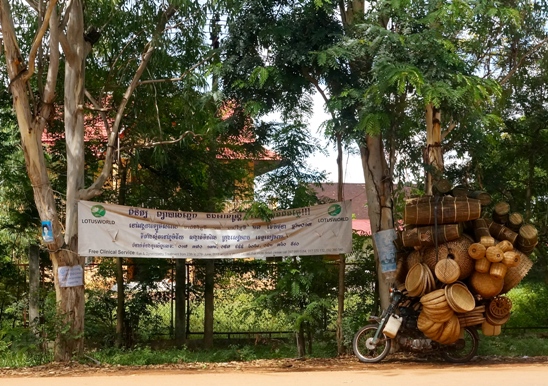
2 hours away from Singapore, the neonatal care in Cambodia is virtually absent with 67% having only skilled attendants at birth and the UNICEF in 2011 reported that infant mortality rate is at least 37 per 1000. Maternal mortality is also at a ratio of 250 per 100,000 live births.
In May 2012, Mr Jonathan Ng and Ms Cheryl Lee, two third year medical students from NUS Medicine, approached the Department of Neonatology seeking assistance in the establishment of a Neonatology Service in the Angkor Children's Hospital (AHC), and at Soknikum, the satellite clinic of the AHC, in Siem Reap, Cambodia. The project was to be funded by the non-profit organisation – Children of Cambodia and would be the first step of its Neonatal Capacity Building Programme for Cambodia. Jonathan is the Chairman of the organisation, and Cheryl, the Coordinator for the programme.
This was well accepted by the department doctors, many of whom came forward to actively participate and contribute cash, time and expertise to provide better medical care for the newborn in Cambodia.
The objective of the programme was to provide a comprehensive training programme in Neonatology which will provide knowledge and practical skills for the local faculty to be able to provide neonatal care in an independent, safe and effective manner with the limited resources.
Working with Jonathan and Cheryl, a basic Neonatology curriculum that would cover a period of 6 months to address priority issues was developed. This included scheduled 3 to 4 day visits at monthly intervals for 6 months by volunteering NUH neonatologists.
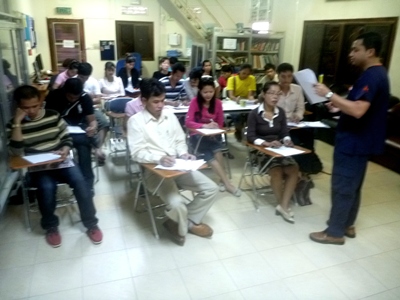 Dr Biswas Agnihotri giving a lecture to the local doctors.
Dr Biswas Agnihotri giving a lecture to the local doctors. | |
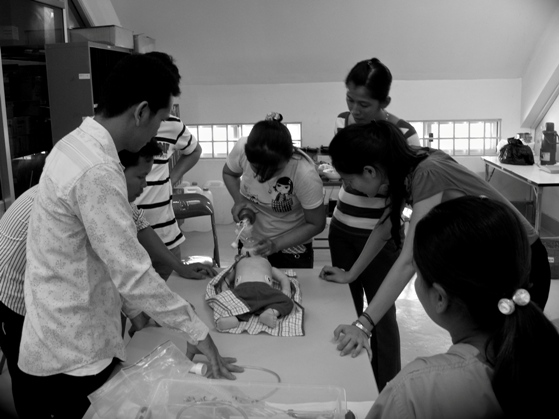 Local doctors practising on a dummy during a skill transfer session.
Local doctors practising on a dummy during a skill transfer session. |
The first outreach visit to AHC commenced on 14 June 2012, followed by monthly visits till November 2012. These trips involved teaching based on interactive case-based sessions on the assigned topic, demonstrating and teaching bedside Neonatology related procedures, conducting bedside teaching rounds and identifying existing practices that needed immediate change. The background reading material was provided to them at the beginning of the programme. Lecture outline and assessment questions were provided so that the local faculty could familiarise themselves with the topic and be better prepared for the sessions. This helped to overcome the communication difficulties created by the language differences and ensured a more effective transfer of clinical knowledge. An assessment and revision on the previous topic was also conducted at each visit. Each visiting NUH consultant provided a report on the visit which facilitated the next visiting consultant in the process.
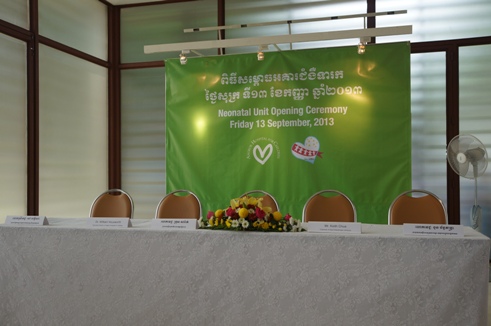 The opening ceremony of the AHC Neonatal Intensive Care Unit (ICU).
The opening ceremony of the AHC Neonatal Intensive Care Unit (ICU). | Dr Claudia Turner, a research paediatrician at the AHC and who had experiences in providing neonatal care in the refugee camps along the Myanmar-Thai border was invited to join the programme; she provided continuity in teaching from January 2013 in the form of bi-weekly ward rounds and weekly formal teaching. A separate premise for the Neonatal ICU was identified. We provided expertise in design and equipment considerations. The neonatal ICU was inaugurated in September 2013, within 15 months of our first visit. |
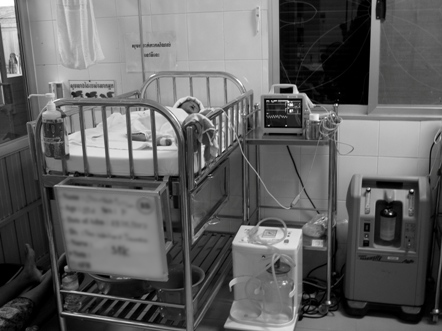 Patient in the neonatal ICU.
Patient in the neonatal ICU. |
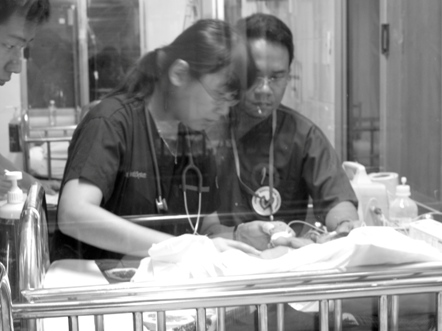 Dr Lee Le Ye attending to a patient with the local doctors.
Dr Lee Le Ye attending to a patient with the local doctors. |
Our second phase of training commenced in October 2013. It involved monthly visits by our consultants for 6 months, focusing on bedside teaching, formalising ICU rounds and proper documentation, ensuring safe and ethical practices are followed. This was to facilitate and train them gradually to move towards independent functioning at the end of the 6-month period. Periodic support was provided subsequently the year after.
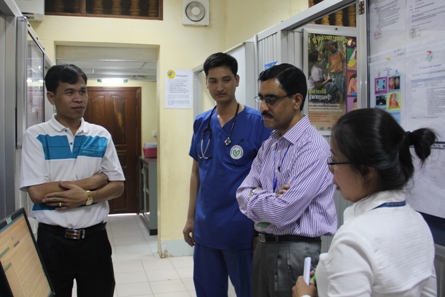 Dr Krishnamoorthy with local doctors during a ward round.
Dr Krishnamoorthy with local doctors during a ward round. |
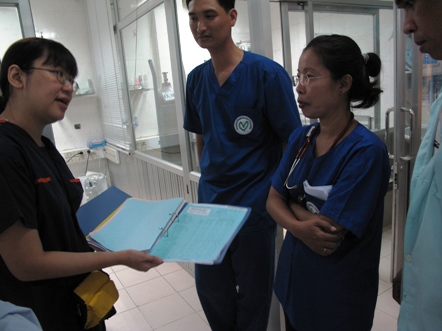 Dr Lee Le Ye with local doctors at a ward round.
Dr Lee Le Ye with local doctors at a ward round. |
Over the course of the year, the doctors and nurses at the AHC have shown increased interest in establishing a higher level of neonatal practice and demonstrated improved outcomes. A group of doctors and nurses demonstrating greater interest and knowledge have been identified as a core group and are being trained to take leadership roles that enable them to function independently. A pair of them spent two weeks in our Department of Neonatology in December 2012 to further develop their clinical skills.
This programme has given our doctors at NUH immense satisfaction to be part of a worthy effort. This has also been a huge learning experience for us to have first-hand knowledge of the challenges of delivering appropriate and safe neonatal care in the midst of limited resources. As a department, we thank Jonathan, Cheryl and the Children of Cambodia organisation for inviting us to be partners in this great project.
Click
here to find out more about AngKor Children hospital.